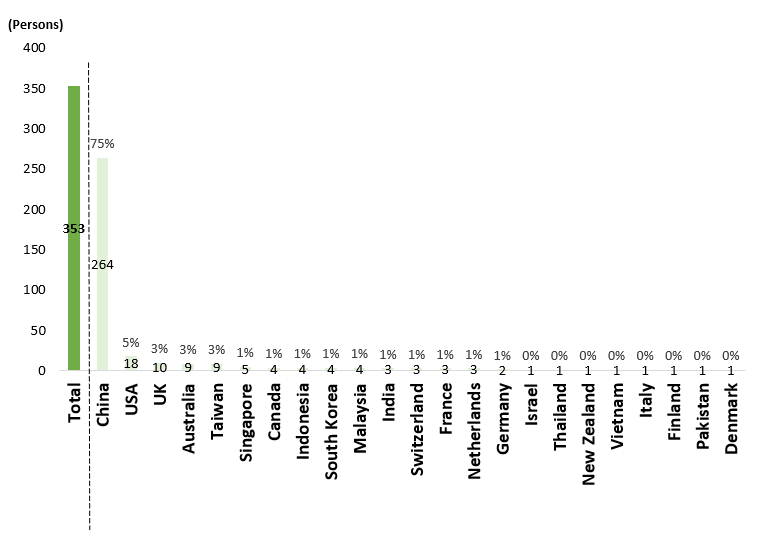Exploring J-Find Visa's Impact & Utilization 2024: The Drive of Global Top Students to Work in Japan
- Jul 26, 2024
- 4 min read
Updated: Jan 5

J-Find (Japan's Future Creation Individual Visa) is a system introduced in April 2023 that grants the "Designated Activities" residency status (Future Creation Human Resources) to individuals who have graduated from prestigious overseas universities or equivalent institutions. This visa allows them to reside in Japan for up to two years (renewable every six months or one year) to conduct job hunting or prepare for starting a business. While awareness of this system remains low, top students worldwide aiming to work in Japan are gradually discovering and utilizing it to live and job hunt in Japan.
This article analyzes the data on the number of foreign residents under the "Designated Activities" (Future Creation Individuals) status, as published by the Immigration Services Agency of Japan on July 5, 2024. By examining this data, we assess the impact and utilization of J-Find visa in its inaugural year of 2023 and discuss future trends.
Current Status of J-Find Application
Figure 1 is a graph illustrating the number of foreign residents under the "Designated Activities" (Future Creation Individuals) status as of the end of December 2023. This number is also divided by the number of J-Find eligible universities in each country and it is described in Figure 2.
Figure 1: Number of Foreign Residents under "Designated Activities" (Future Creation Individuals) Status as of December 2023*1
(*Note: This does not represent the number of J-Find applications from April to December 2023)

Figure 2: Number of Foreign Residents under "Designated Activities" (Future Creation Individuals) Status per J-Find Eligible University in Each Country as of December 2023*2
(*Note: The numerator represents the number of foreign residents by nationality, which includes regular international students counted under their respective nationalities. Therefore, this figure may not accurately reflect the topic at hand)

Analysis
As shown in Figure 1, as of the end of December 2023, the number of foreign residents utilizing the J-Find system was 353. In comparison, the UK's equivalent, the High Potential Individual Visa, issued 1,342 visas in its first year after implementation in May 2022. This comparison makes Japan's figure appear modest. However, it's important to note that the 353 figure does not represent the total applications from April to December 2023, making a direct comparison somewhat inappropriate. Nonetheless, considering the criticism regarding the low number of visas issued under the UK's High Potential Individual Visa, it seems reasonable to describe the J-Find numbers as relatively low.
However, a significant difference between Japan and the UK is the language barrier. The UK, with English as its official language, can more easily attract international students from around the world, whereas Japan's official language is Japanese, which poses a language barrier for many students. Additionally, 2023 witnessed a historic depreciation of the yen, further complicating financial calculations for potential applicants. Despite these challenges—language and exchange rates—the fact that 353 students were utilizing J-Find by the end of December 2023 to seek employment might indicate that Japan still holds considerable potential as a workplace among top global students.
Notably, Chinese nationals accounted for a whopping 75% of all J-Find applications. Figure 2 shows that China had a significantly higher number of applicants per eligible university, with 22 people per university, which was the highest among all countries. Other APAC countries also showed higher numbers. It’s important to recognize that these figures include students who have studied in universities of other countries, thus making exact analysis challenging and largely speculative. However, the noticeably lower figures from geographically distant countries like the US and Germany, which had relatively stable economic conditions in 2023, suggest that economic conditions and geographical factors are likely significant contributors to the variability in J-Find application numbers. While micro factors like awareness could also influence these numbers, their impact in the first year of J-Find is expected to be minimal.
Future of J-Find
While J-Find's application numbers are significantly influenced by macroeconomic conditions and geographical factors, the recent stabilization of the yen and the increase in Japan-based positions requiring less Japanese language proficiency (for more details, visit the Jelper Club homepage) suggest that the number of J-Find applications could increase in the future.
Despite persistent negative stereotypes about working in Japan, the number of companies actively addressing labor conditions and wage levels has surged recently. International students with even a slight interest in working in Japan are encouraged to apply for J-Find and experience Japan firsthand. They might be surprised by the disparity between the stereotypes and the reality of working in Japan.
Those exploring employment opportunities under J-Find should consider registering with Jelper Club. Many companies are seeking top global talents and offer Jelper Club-exclusive positions, likely providing a perfect match for your career aspirations. Additionally, many others utilizing J-Find are also registered, offering a chance to find peers with similar goals.
At Jelper Club, we're here to support you every step of the way for your career development in Japan. Our platform connects ambitious students from top universities worldwide with exclusive internship and full-time job opportunities in Japan with a variety of Japanese proficiency requirements. We also provide access to practical information, member-only events, and a professional community of like-minded individuals.
If you're ready to embark on your own Japanese adventure, visit Jelper Club today and discover how we can help you unlock your potential in Japan.
(Editor: Jelper Club Editorial Team)
Sources and Notes
1. 「在留外国人統計(旧登録外国人統計)」(出入国在留管理庁):https://www.e-stat.go.jp/stat-search/files?page=1&layout=datalist&toukei=00250012&tstat=000001018034&cycle=1&year=20230&month=24101212&tclass1=000001060399&stat_infid=000040186953&result_back=1&tclass2val=0
2. 「未来創造人材制度の対象となる大学一覧」(出入国在留管理庁):https://www.moj.go.jp/isa/content/001394994.pdf
3. "Home Office publishes latest immigration statistics" (Laura Devince Immigration): https://www.lauradevine.com/news/home-office-publishes-latest-immigration-statistics/
4. "Why the High-Potential Individual visa route won’t attract the brightest and best to the UK" (Yash Dubal): https://www.peoplemanagement.co.uk/article/1789650/why-high-potential-individual-visa-route-wont-attract-brightest-best-uk



Comments